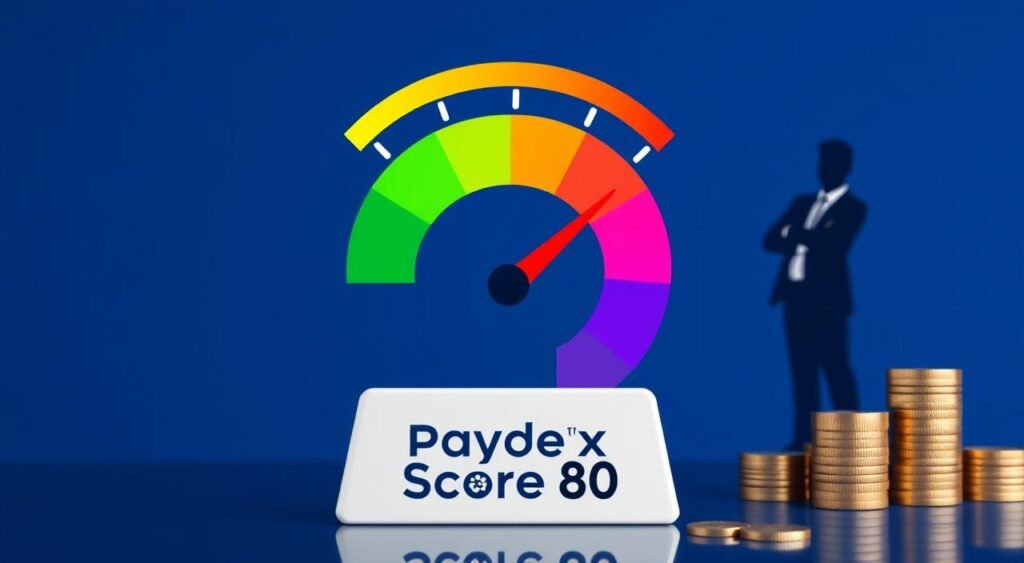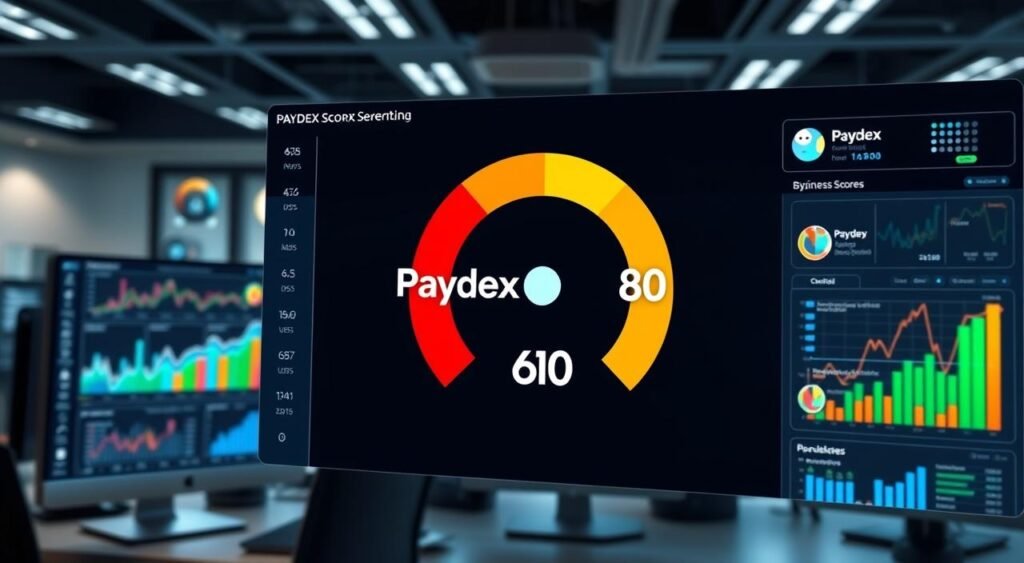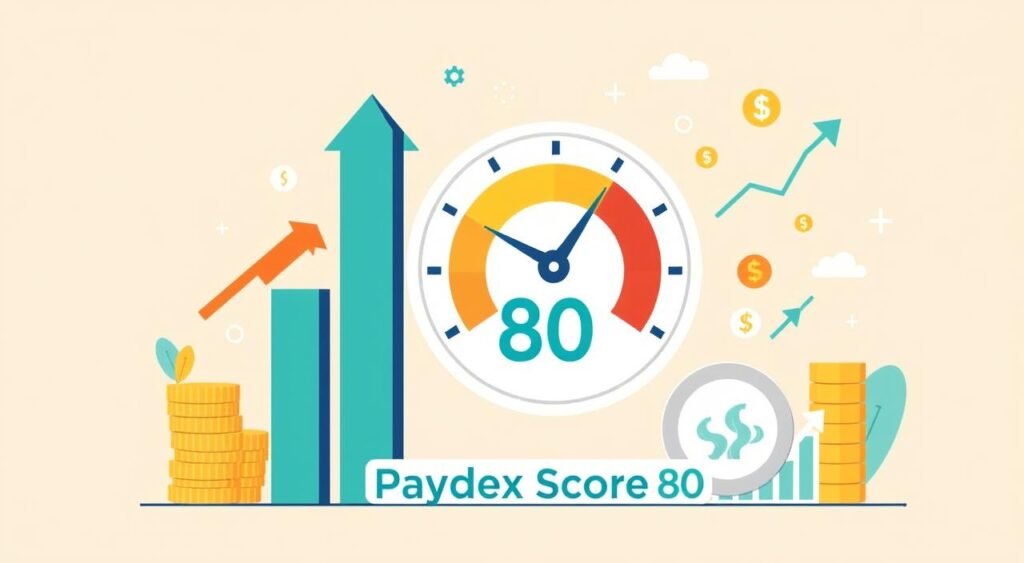Is your business struggling to secure financing due to a low credit score? The PAYDEX Score, a crucial metric for small businesses, might be the key to unlocking better financial opportunities. This unique indicator, ranging from 0 to 100, reflects how a company manages its bill payments over the past year1.
Understanding and improving your PAYDEX Score is vital for obtaining the small business financing options you need to fuel growth. Let’s explore essential strategies to boost your score and enhance your credit score management.
Did you know that a PAYDEX Score of 80 or higher is typically preferred by businesses checking credit, as it indicates timely or early payments1? This benchmark underscores the importance of maintaining a strong payment history to improve your chances of securing favorable financing terms.
Key Takeaways:
- PAYDEX Scores range from 0 to 100, with higher scores indicating lower risk
- A score of 80 means invoices are paid on time, on average
- Timely payments are crucial for maintaining a good PAYDEX Score
- At least three payment experiences from two tradelines are needed for a PAYDEX Score
- Larger payments have a more significant impact on your score
- Monitoring and managing credit utilization is essential
- Establishing trade lines with suppliers can help build credit
Understanding the PAYDEX Score
The PAYDEX Score is a crucial metric for businesses, measuring their payment performance to suppliers and vendors. This score, developed by Dun & Bradstreet, plays a significant role in debt repayment strategies and payment history optimization.
What is a PAYDEX Score?
A PAYDEX Score is a numerical representation of a business’s payment history, ranging from 1 to 100234. It serves as a key indicator of a company’s creditworthiness, helping other businesses make informed decisions about extending credit or setting payment terms.
How PAYDEX Scores are calculated
Dun & Bradstreet calculates PAYDEX Scores based on payment reports from suppliers and vendors. To generate a score, they require at least three trade experiences from two reporting parties2. The calculation is dollar-weighted, meaning larger transactions have a greater impact on the score3.
PAYDEX Score ranges and their meanings
Understanding PAYDEX Score ranges is essential for effective payment history optimization. Here’s a breakdown:
| Score Range | Risk Level | Payment Behavior |
|---|---|---|
| 80-100 | Low | On-time or early payments (0-30 days before due date) |
| 50-79 | Medium | Payments up to 30 days late |
| 1-49 | High | Payments 31-120 days late |
Maintaining a PAYDEX Score of at least 75 is recommended for businesses aiming to demonstrate low risk to potential creditors3. A score of 100 indicates consistent payments made 30 days in advance, showcasing excellent fiscal responsibility3.
The Importance of Your PAYDEX Score for Business Credit
Your PAYDEX score plays a crucial role in business credit building and financial responsibility. This numerical score, ranging from 1 to 100, reflects your company’s payment history and creditworthiness3. A higher score indicates better financial health, with 80 or above considered excellent4.

Maintaining a strong PAYDEX score is essential for several reasons. It influences your ability to secure favorable financing terms, establish relationships with suppliers, and even negotiate better lease agreements. Lenders, vendors, and potential business partners often use this score to assess your company’s reliability3.
A PAYDEX score of 75 or higher signals low risk to creditors, increasing your chances of qualifying for loans and credit lines34. This can lead to lower interest rates, higher credit limits, and more flexible payment terms with suppliers. In contrast, a score below 50 may indicate high risk, potentially limiting your access to credit or resulting in less favorable terms4.
“A good credit score can open doors to better financial opportunities for your business.”
To build and maintain a strong PAYDEX score, focus on timely payments. Consistently paying bills early can significantly boost your score, with payments made 30 days in advance potentially earning you a perfect 1003. Remember, the score is dollar-weighted, meaning larger debts have a greater impact on your rating4.
Regularly monitoring your PAYDEX score is crucial for maintaining good business credit. It allows you to identify and address any issues promptly, ensuring your score accurately reflects your company’s financial responsibility5. By prioritizing your PAYDEX score, you’re investing in your business’s financial future and opening doors to growth opportunities5.
How to Check Your PAYDEX Score
Checking your PAYDEX score is crucial for effective credit monitoring and vendor relationship maintenance. Business owners have several options to access this important metric.
Free Options for Checking Your Score
Dun & Bradstreet offers a free service called Credit Insights, which provides basic company information and credit score trends. While this doesn’t give you the actual PAYDEX score, it’s a useful starting point for monitoring your business credit6.
Some banks, like Bank of America, offer free access to Dun & Bradstreet credit scores for eligible small business customers enrolled in specific checking accounts6. This perk can be valuable for ongoing credit monitoring without additional costs.

Paid PAYDEX Score Monitoring Services
For more comprehensive credit monitoring, paid services are available. Dun & Bradstreet’s Basic plan costs $49 monthly or $499 annually, providing access to your business credit scores and history6. This option is ideal for businesses seeking detailed insights into their credit standing.
Experian offers various paid options for credit monitoring. Their CreditScore Report is priced at $39.95, while the ProfilePlus Report, which includes your credit score and history, costs $49.956. For ongoing access, consider their annual subscriptions: Business CreditAdvantage at $189 per year or Business CreditScore Pro at $1,495 per year6.
These paid services not only provide your PAYDEX score but also offer tools for improving your credit standing and maintaining positive vendor relationships. By investing in regular credit monitoring, you can proactively manage your business’s financial health and creditworthiness.
Timely Payments: The Key to a Higher PAYDEX Score
Paying your bills on time is crucial for a good PAYDEX score, but paying early can boost it even higher. The PAYDEX score ranges from 0 to 100, with higher scores indicating better payment performance78.
To achieve a score above 80, which represents low risk, you need to pay bills before they’re due. Payments made within 30 days before the due date can result in a score of 80 to 10079.
Your timely payment habits significantly impact your score. Payments made 2 to 30 days after the due date put you in the medium risk category with a score of 50 to 79. Falling behind by 31 to 120 days drops your score to 0 to 49, indicating high risk9.
Remember, larger payments have a more substantial impact on your PAYDEX score. Prioritize early payments for higher-value invoices to maximize your score improvement. Consistently paying early helps maintain a strong PAYDEX score and enhances your overall business credit profile.
Keep in mind that your credit utilization ratio also plays a role in your business credit health. Balancing timely payments with responsible credit use creates a solid foundation for your business’s financial reputation.
“A high PAYDEX score can open doors to better financing options, more favorable payment terms with suppliers, and attract potential partners and investors.”
By focusing on timely payments and maintaining a low credit utilization ratio, you’re setting your business up for success in the eyes of creditors and lenders.
Establishing and Maintaining Trade Lines
Trade lines play a crucial role in vendor relationship maintenance and business credit building. These credit accounts, reported to business credit bureaus, form the backbone of your company’s financial reputation.
What are Trade Lines?
Trade lines are credit accounts that suppliers or vendors report to business credit bureaus. They showcase your payment history and credit utilization, influencing your PAYDEX score. Establishing trade lines with suppliers who report to credit bureaus can enhance business credit scores10.

How to Establish Trade Lines with Suppliers
To set up trade lines, follow these steps:
- Register your business correctly and obtain an Employer Identification Number (EIN)10
- Apply for a DUNS number, a unique nine-digit identifier from Dun & Bradstreet1011
- Identify suppliers who report to credit bureaus
- Open accounts with these vendors, preferably those offering net 30 terms11
- Use your accounts regularly and responsibly
Managing Existing Trade Lines Effectively
Effective management of trade lines is key to business credit building. Make early payments to boost your Paydex score, as Dun & Bradstreet rewards this practice10. Keep your credit utilization low and maintain open communication with your suppliers. Regular monitoring of your business credit reports ensures accuracy and helps identify areas for improvement10.
“Building strong business credit allows for better terms on business loans, lower rates on business insurance, and more favorable terms with suppliers.”
Remember, building a robust business credit profile takes time. With consistent effort in vendor relationship maintenance and responsible credit use, you can establish a strong financial foundation for your company11.
Credit Utilization and Its Impact on Your PAYDEX Score
Your credit utilization ratio plays a crucial role in your overall business credit profile. While it doesn’t directly affect your PAYDEX Score, it can influence your ability to secure financing. Lenders often view high credit utilization as a risk factor, potentially impacting your borrowing options.
To demonstrate financial responsibility, aim to keep your credit utilization below 30% of your available credit. This practice not only helps maintain a healthy business credit profile but also signals to lenders that you manage your credit wisely.
Different business credit bureaus use various factors for scoring, including payment history, length of credit history, and credit utilization rate12. Dun & Bradstreet’s PAYDEX Score, which ranges from 0 to 100, considers early and on-time payments as positive factors12.
Consider these strategies to manage your credit utilization:
- Monitor your credit regularly
- Pay down existing debts
- Increase your credit limits
- Use debt-free funding options like invoice factoring
Remember, maintaining a strong business credit score, typically within the top 20% of the scoring system’s range, can significantly improve your chances of securing larger loans with favorable terms and lower interest rates1213. By focusing on your credit utilization and overall financial responsibility, you’ll be better positioned to boost your PAYDEX Score and enhance your business’s creditworthiness.
Small Business Financing Options and Their Effect on PAYDEX
When seeking funds for your business, it’s crucial to understand how different small business financing options can impact your PAYDEX score. Your choice of funding can significantly influence your creditworthiness and future borrowing potential.
Traditional Loans vs. Alternative Financing
Traditional bank loans often require a business credit score of around 70, making them challenging for many small businesses to obtain14. Online lenders, on the other hand, may approve loans for businesses with scores as low as 50, offering more accessible alternative financing options14.
Here’s a comparison of traditional and alternative financing:
| Aspect | Traditional Loans | Alternative Financing |
|---|---|---|
| Credit Score Requirement | 70+ | 50+ |
| Approval Process | Lengthy | Quick |
| Collateral | Often Required | Not Always Needed |
| Flexibility | Limited | More Flexible Terms |
Impact on Your PAYDEX Score
Different financing methods can affect your PAYDEX score in various ways. On-time payments are crucial for maintaining a good credit history and score, regardless of the financing type15. Keeping debt low can positively impact your business credit scores and overall creditworthiness15.
It’s important to note that while business loans typically don’t affect personal credit scores, this can change if there’s a personal guarantee involved15. Regularly monitoring your business credit reports can help you spot and correct errors that may affect your credit scores15.
Remember, establishing business credit through tradelines that report to business credit bureaus is crucial for improving your scores15. By carefully considering your financing options and their potential impact on your PAYDEX score, you can make informed decisions that support your business’s financial health and growth.
Monitoring and Disputing Errors in Your Business Credit Report
Keeping a close eye on your business credit report is crucial for effective credit score management. Regular credit monitoring helps spot and fix errors that could harm your financial opportunities16. Unlike personal credit, small businesses must pay to access their reports from major bureaus like Experian, Equifax, and Dun & Bradstreet17.
Mistakes in your report can range from misspelled names to outdated balances or incorrect account statuses. These errors might lead to loan rejections or higher interest rates17. Even small inaccuracies, such as wrong industry codes, can impact your credit score and financial prospects17.
Steps to Dispute Errors
- Review your reports from all three business credit bureaus
- Identify any discrepancies or inaccuracies
- Gather supporting documentation
- Contact the bureau and the company that provided the incorrect information
- Submit a formal dispute with evidence
Each credit bureau has its own dispute process. Be prepared to resubmit if needed to ensure proper resolution16. Remember, credit bureaus have 30 days to investigate disputes, and businesses must correct wrong information found18.
“Correcting mistakes on business credit reports is essential to ensuring accurate representation of the company’s financial activity, enhancing the likelihood of qualifying for favorable financing offers.”
By staying vigilant with your credit monitoring and promptly addressing errors, you safeguard your business’s financial health and credibility. This proactive approach to credit score management can open doors to better financing options and business opportunities.
Conclusion
Boosting your PAYDEX score is crucial for small business success. By making timely payments and managing trade lines effectively, you can significantly improve your score. Remember, a higher PAYDEX score opens doors to better small business financing options and more favorable credit terms.
When exploring financing, consider various sources. SBA loans offer up to $5 million in financing, with 504 loans requiring only a 10% down payment19. Online lenders are gaining popularity, with 37% of medium- or high-risk credit applicants turning to them in 202220. Credit unions have also increased their small-business lending by over 50% from 2017 to 2021, often offering lower rates and fees compared to banks1920.
For those with less-than-perfect credit, Community Development Finance Institutions (CDFIs) provide capital on reasonable terms, considering the circumstances behind poor credit scores21. Alternative options like invoice financing, crowdfunding, and peer-to-peer lending can help maintain cash flow and secure funding. By understanding these options and consistently working to improve your PAYDEX score, you’ll position your business for growth and long-term success.
FAQ
What is a PAYDEX Score?
How can I check my PAYDEX Score?
What is the most effective way to improve my PAYDEX Score?
What are trade lines, and why are they important?
How does credit utilization affect my PAYDEX Score?
How do different financing options impact my PAYDEX Score?
Why should I monitor my business credit report?
Source Links
- PAYDEX Score: The Only Ultimate Guide You Need To Read – https://www.forbes.com/advisor/credit-score/paydex-score/
- Paydex Score: Everything You Need to Know – https://paymentcloudinc.com/blog/paydex-score/
- PAYDEX Score: The Dun & Bradstreet Business Credit Rating – https://www.nav.com/business-credit-scores/dun-bradstreet-paydex/
- Understanding the Paydex Score – https://www.businessinsider.com/personal-finance/credit-score/what-is-paydex-score
- The Importance of Business Credit Scores – https://www.chase.com/business/knowledge-center/start/business-credit-scores
- How to check your business credit score for free – https://www.cnbc.com/select/free-business-credit-score/
- Paydex Scores: Your Key to Small Business Financial Success. – https://www.paycron.com/blog/unlocking-financial-success-a-comprehensive-guide-to-paydex-scores-for-small-businesses
- PAYDEX Score: The Dun & Bradstreet Business Credit Rating – https://ramp.com/blog/what-is-a-paydex-score
- What Is A Paydex Score? | Bankrate – https://www.bankrate.com/credit-cards/business/what-is-paydex-score/
- How to Get and Build Business Credit in 9 Steps – https://www.nerdwallet.com/article/small-business/how-to-build-business-credit-small-business-loans
- How to build business credit in 7 easy steps | Swoop IE – https://swoopfunding.com/us/support-for-small-businesses/how-to-build-your-business-credit/
- Do Credit Checks Lower My Business Credit Score? | OnDeck – https://www.ondeck.com/resources/do-credit-checks-lower-my-business-credit-score
- Credit Score Impact on Small Business Financing Options | Republic Bank of Chicago – https://republicebank.com/credit-score-impact-on-small-business-financing-options/
- Navigating Business Credit Scores: Impact on Small Business Loan Options | EBC – https://eaglebusinesscredit.com/blog/navigating-business-credit-scores-impact-on-small-business-loan-options/
- The Role of Credit Scores in Securing Business Financing: What You Need to Know | Nav – https://www.nav.com/blog/credit-in-securing-business-financing-3659335/
- How to Dispute Errors on Your Credit Report | OnDeck – https://www.ondeck.com/resources/dispute-errors-credit-report
- How to Dispute a Business Credit Report | SoFi – https://www.sofi.com/learn/content/disputing-business-credit-report/
- Disputing Errors on Your Credit Reports – https://consumer.ftc.gov/articles/disputing-errors-your-credit-reports
- Small-Business Financing Options – https://money.com/small-business-financing-options/
- Financing Options for Small Businesses – NerdWallet – https://www.nerdwallet.com/article/small-business/small-business-financing
- 11 Non-Bank Small Business Financing Options – https://www.businessnewsdaily.com/1733-small-business-financing-options-.html

